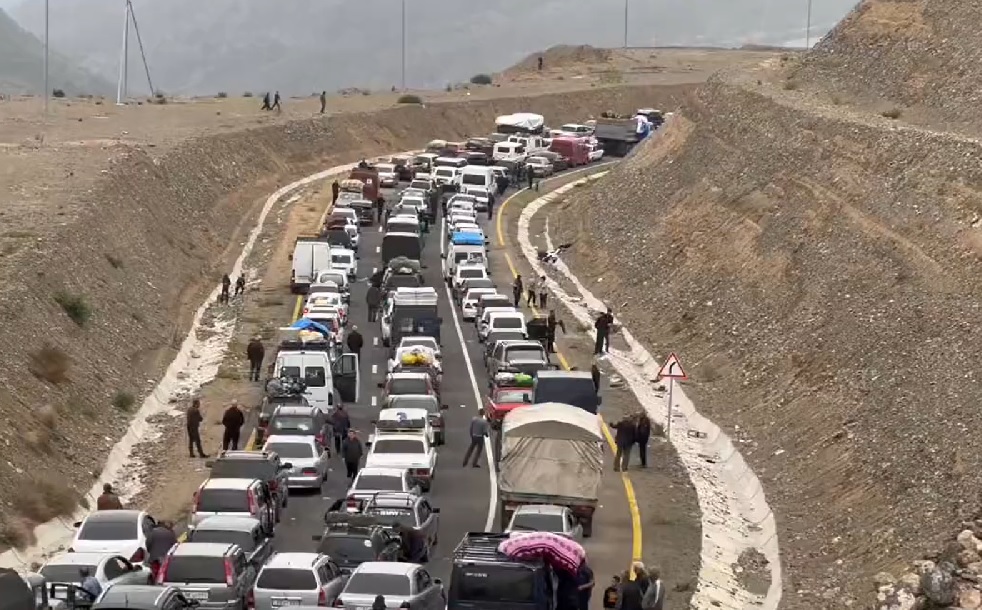Azerbaijan's Karabakh between ethnic cleansing and new history
What will be the future of this symbolic territory after 35 years of often bloody and tragic conflict? For former Georgian minister Zakareišvili, Aliev's promises are not enough: Baku must decide whether it wants to integrate or force all Armenians to leave.
Moscow (AsiaNews) - While tens of thousands of Armenians are fleeing from their homes in Artsakh, the Armenian enclave now subjugated by Baku's army, many are wondering what the future of this symbolic territory, in the heart of contradictions, will be of the Southern Caucasus.
The Armenians of Nagorno Karabakh do not believe the promises of the Azerbaijani authorities on guarantees of security and respect for rights, after 35 years of often bloody and tragic conflict.
Now everything is in the hands of Azerbaijan, to which both Russia and Armenia itself have left the initiative, opting out for various reasons. One of the region's leading experts, the Georgian conflictologist Paata Zakareišvili, Georgia's reintegration minister for several years, spoke about this with local BBC correspondents.
Philosopher and humanitarian activist, very active in the conflicts with Abkhazia and South Ossetia, he is today one of the leaders of the Republican Party of Tbilisi, one of the few formations that seek a balance between the conflicting forces towards East or West.
"Reintegration" is precisely the objective of the Azeris towards the Armenians in the subjugated area, and from this many of them are trying to escape. Zakareišvili was called to deal with the issue in his country, and as his first choice he wanted to replace the term with that of "reconciliation and equal civil rights", because in his opinion reintegration "is only the final phase of the conflict, while it is necessary to deal with the dialogue between different populations, long placed in opposition to each other".
Negotiations between Azeris and Karabakh Armenians can become exhausting and without real results, as it has been for a long time between Georgians, Abkhazians and Ossetians.
As the ex-minister explains, "true reintegration must be mutual, voluntary and must have time to mature, which has not happened in Georgia". The question of equal civil rights has no automatic solutions, the statement continually repeated by President Ilham Aliev and all Azerbaijani politicians is not enough, according to which "if Armenians respect our laws, they will be citizens like everyone else". It is the same problem that has been unresolved for years between Russians and Ukrainians in the disputed areas, which led to the dramatic conflict that has now largely gone beyond the internal issues of the nationalities.
Negotiations between the parties are underway in the city of Evlakh, but as Zakareišvili repeats "Azerbaijan must decide on the status it wants to assume, whether that of a welcoming or rejecting country, whether to integrate or force the Armenians to leave, we will see it in the next months".
A lot of blood has been shed, and there is no basis for mutual trust between the two peoples, so "for the moment there is no point in insisting too much either on one side or the other".
Those who intend to maintain Armenian citizenship, remaining in their homes, can be granted a transitional period, "five or ten years", guaranteeing their safety. Those who choose Azerbaijani citizenship will obviously be able to enjoy various advantages.
The question of safeguarding the native language, the freedom of the Armenian Church and all other fundamental identity elements will have to be evaluated, and of course the finally free access to the Lachin corridor, the blockade of which was used by the Azeris as blackmail to finally justify military intervention.
According to the conflictologist, in agreement with many other observers, President Aliev has an "epochal chance" in his hands, to overcome misunderstandings accumulated over the centuries in the Caucasian lands.
Taking example from many conflicts of the past throughout Europe, such as that between the Germans and the French after the Second World War, one must come to the conclusion that all this remains "a bad dream of past history".
29/09/2021 09:02
12/01/2023 09:18
20/09/2022 10:03







.png)










